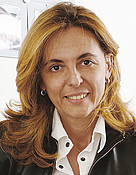Profile exzellenter Wissenschaftlerinnen und Wissenschaftler bei AcademiaNet.
Mitglieder
Mitgliederverzeichnis | Expertensuche
Suchen Sie unter den Mitgliedern der Leopoldina nach Expertinnen und Experten zu Fachgebieten oder Forschungsthemen.

Federica Sallusto
| Wahljahr: | 2009 |
| Sektion: | Mikrobiologie und Immunologie |
| Stadt: | Bellinzona |
| Land: | Schweiz |
Forschung
Research priorities: immune systems, immunological memory, autoimmune diseases, vaccinations, T cells, leukocyte regulation
Federica Sallusto is a microbiologist specializing in immunology. She developed methods with which T cells could be investigated and identified. This work provided essential insights into the human immune system.
Federica Sallusto and her team researched the activation of T cells. T cells are part of the immune system. They combat pathogenic agents and suppress autoimmune diseases. Federica Sallusto also developed methods that could be used to investigate the reactions of T cells to pathogens, antigens and self-antigens. She also established a cell culturing method that can be used to produce T cells with defined properties for vaccination studies.
In another new method, she used chemokine receptors as markers to distinguish helper T cells (Th1, Th2) from each other. Based on this method, she was able to define groups and sub-sets of memory T cells. Memory T cells are a subset of infection- and cancer-fighting T cells (also known as a T lymphocytes). They store learned immune reactions and, when confronted with a renewed infection, trigger a rapid immune response.
Federica Sallusto and her working group were also able to explain the mechanisms of lymphocyte regulation in cases of inflammation and autoimmunity. The task of lymphocytes is to ward off pathogens and to combat “altered self” cells (tumour cells). She has also shown how special helper T cells (pioneer Th17 cells) pave the way to the brain for other cells that cause autoimmune diseases. Her research has served to further elucidate the fundamentals of the human immune system.
Werdegang
- since 2017 Professor of Medical Immunology, Institute of Microbiology, The Swiss Federal Institute of Technology (ETH) Zurich, Switzerland
- since 2016 Director of the Center of Medical Immunology and Head of the Cellular Immunology Laboratory at the Institute for Research in Biomedicine (IRB), Università della Svizzera italiana (USI), Bellinzone, Switzerland
- since 2010 Member of the Microbiology and Immunology PhD program, University of Zurich, Switzerland
- 2003-2005 Adjunct Professor of Immunology, University of Palermo, Italy
- since 2000 Research Group Leader at the Cellular Immunology Laboratory, Institute for Research in Biomedicine, Bellinzona, Switzerland
- 1997-2000 Scientist at the Basel Institute for Immunology (BII), Basel, Switzerland
- 1993-1995 Guest Scientist, Basel Institute for Immunology (BII), Basel, Switzerland
- 1991-1997 Research Assistant (Tenure position), National Italian Institute of Health, Rome, Italy
- 1989-1991 Postdoctoral Fellow, National Italian Institute of Health, Rome, Italy
- 1988 PhD in Biology at the University La Sapienza, Rome, Italy
Funktionen
- 2013-2015 President of the Swiss Society of Allergology and Immunology
Projekte
- since 2016 DFG project “Prinzipien und Mechanismen der Erkennung des X-Chromosoms während der Dosiskompensation von Drosophila”
- since 2013 Spokesperson of the Collaborative Research Centre (SFB) 1064: “Chromatindynamik”
- since 2013 DFG project “Kooperation von Nukleosomen Remodeling Faktoren zum Einbau und Austausch von Histon H2A.V“, sub-project of SFB 1064: “Chromatindynamik”
- 2011-2014 Associate member and elected spokesperson of associated members of the Network of Excellence “EpigeneSys”
- 2008-2014 DFG project “Contributions of chromatin remodelling factors CHRAC/ACF to epigenome programming during oogenesis and early embryogenesis in Drosophila melanogaster”, sub-project of SPP 1356: “Pluripotency and Cellular Reprogramming”
- since 2007 Founding member and member of the executive board of the Excellence Cluster “Munich Center for Integrated Protein Science” (CIPSM)
- 2006-2011 DFG Excellence Cluster “Center for Integrated Protein Science”
- 2006-2009 DFG project “Human Chromatin Accessibility Complex and Chromosomal Instability”, sub-project of SFB 684: “Molekulare Mechanismen der normalen und malignen Hämatopoese”
- 2004-2010 Network of Excellence “The Epigenome” (founding member), Sixth EU Framework Programme
- 2002-2012 DFG project “Dosis Kompensation in Drosophila”, sub-project of TRR 5: “Chromatin: Aufbau und Vererbung von Struktur und Genaktivität”
- 2002-2005 INTAS 01-0211 “The role of a group of newly described functionally related genes in transcription control in metazoans”
- 2002-2012 Spokesperson of the DFG Collaborative Research Centre TR5 “Chromatin: Aufbau und Vererbung von Struktur und Genaktivität”
- 2001-2012 DFG project “Chromatin Remodelling durch den, Chromatin Accessibility Complex (CHRAC)”, sub-project of SFB 594: “Molekulare Maschinen in Proteinfaltung und Proteintransport”
- 2000-2003 IHP Network HPRN-CT2000-0078 “Cellular Memory: Epigenetic regulation and inheritance of active and silent chromatin states”
- 1999-2003 Coordinator Network Grant “Mechanisms of Insulator Action”, Volkswagen Foundation
- 1998-2001 Coordinator of the EU TMR Network ERBFMRXCT98-191 “Gene regulation by Chromatin”
- 1998-2000 HFSPO Network “Histone acetylation, transcriptional control and cell proliferation”
Auszeichnungen und Mitgliedschaften
- since 2022 Member of the National Academy of Sciences, USA
- 2013 ERC Advanced Grant
- since 2011 Member of the European Academy of Tumor Immunology
- since 2011 Member of the European Molecular Biology Organization (EMBO)
- 2010 Science Award, Foundation for Study of Neurodegenerative Diseases
- since 2009 Member of the National Academy of Sciences Leopoldina
- 2009 Behring Lecture
- since 2007 Member of the Henry Kunkel Society
- 1999 Pharmacia Research Foundation Award
KONTAKT

Archiv
Emil-Abderhalden-Str. 35
06108 Halle (Saale)
| Tel. | 0345 - 47 239 - 120 |
| Fax | 0345 - 47 239 - 149 |
| archiv (at)leopoldina.org |
